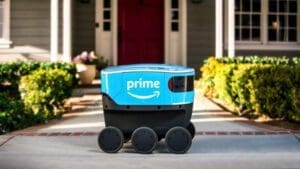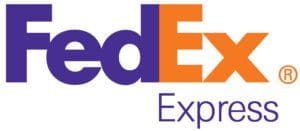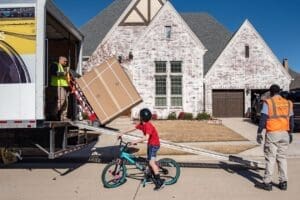 The kick-off to the 2020 Summer Olympics in Tokyo, Japan is just two weeks away, after being postponed last summer due to the Covid-19 pandemic. During a normal Olympics, millions of spectators flock to venues to watch over 300 events unfold over the course of two-plus weeks. However, this year, like most everything during Covid, will be different. Earlier this week, a resurgent coronavirus forced Japan to declare a state of emergency in the capital that will run throughout the event. As a result, the Olympics will take place without spectators. Prime Minister Yoshihide Suga said it was essential to prevent Tokyo, where the highly infectious Delta COVID-19 variant was spreading, from becoming the source of another wave of infections. Venues outside the greater Tokyo metropolitan area would allow small numbers of spectators, and the policy for the Paralympics will be decided next month. It will be interesting to watch the games unfold in silence. And now on to this week’s logistics news.
The kick-off to the 2020 Summer Olympics in Tokyo, Japan is just two weeks away, after being postponed last summer due to the Covid-19 pandemic. During a normal Olympics, millions of spectators flock to venues to watch over 300 events unfold over the course of two-plus weeks. However, this year, like most everything during Covid, will be different. Earlier this week, a resurgent coronavirus forced Japan to declare a state of emergency in the capital that will run throughout the event. As a result, the Olympics will take place without spectators. Prime Minister Yoshihide Suga said it was essential to prevent Tokyo, where the highly infectious Delta COVID-19 variant was spreading, from becoming the source of another wave of infections. Venues outside the greater Tokyo metropolitan area would allow small numbers of spectators, and the policy for the Paralympics will be decided next month. It will be interesting to watch the games unfold in silence. And now on to this week’s logistics news.
- Amazon plans to build delivery robot tech in Finland
- FedEx invests $2 billion in sustainability initiatives
- Porsche calls on its suppliers to use 100% renewable energy
- Descartes acquires GreenMile
- Restaurants, bars find suppliers’ inventories are running dry
- Furniture makers are seeing increasing backlogs
- Container shipping prices skyrocket
 Amazon has announced that it plans to develop new technology for its autonomous delivery vehicles in Helsinki, Finland. The company is setting up a new “Development Center” to support Amazon Scout, which is a fully electric autonomous delivery robot that is being tested in four US locations. Roughly the size of a small cooler, Amazon Scout vehicles can transport small packages along sidewalks at walking pace. Two dozen engineers will be based at the Amazon Scout Development Center in Helsinki initially, and they will be focused on research and development. The launch of the new development center in Helsinki comes six months after Amazon acquired local 3D modeling firm Umbra. The engineers will begin by developing 3D software to emulate the “complexities of real life.” Amazon said the development center in Helsinki will work alongside Amazon staff at the Amazon Scout R&D lab in Seattle, as well as teams in Tubingen, Germany, and Cambridge.
Amazon has announced that it plans to develop new technology for its autonomous delivery vehicles in Helsinki, Finland. The company is setting up a new “Development Center” to support Amazon Scout, which is a fully electric autonomous delivery robot that is being tested in four US locations. Roughly the size of a small cooler, Amazon Scout vehicles can transport small packages along sidewalks at walking pace. Two dozen engineers will be based at the Amazon Scout Development Center in Helsinki initially, and they will be focused on research and development. The launch of the new development center in Helsinki comes six months after Amazon acquired local 3D modeling firm Umbra. The engineers will begin by developing 3D software to emulate the “complexities of real life.” Amazon said the development center in Helsinki will work alongside Amazon staff at the Amazon Scout R&D lab in Seattle, as well as teams in Tubingen, Germany, and Cambridge.
 FedEx announced that it is investing $2 billion in three crucial areas: sustainable energy, carbon sequestration, and vehicle electrification. The pandemic brought an unprecedented rush of airfreight demand across the globe, which forced FedEx to keep several aging aircraft active, and delaying several renewals. This was part of the reason the company missed its 2008 goal to reduce aircraft emissions by 20 percent by the end of 2020. FedEx now has a mission to be carbon-neutral by 2040. A major player in the sustainability mission is FedEx’s Fuel Sense initiatives, which are designed to reduce fuel consumption in the carrier’s aircraft and involve innovating operations to reduce environmental impact. The company also retired the last active commercial MD-10-10F in the world last month. New aircraft purchases are focused around twinjets such as the Boeing 767 and 777. Notably, the 767 is around 30 percent more efficient than the MD-10s that were phased out.
FedEx announced that it is investing $2 billion in three crucial areas: sustainable energy, carbon sequestration, and vehicle electrification. The pandemic brought an unprecedented rush of airfreight demand across the globe, which forced FedEx to keep several aging aircraft active, and delaying several renewals. This was part of the reason the company missed its 2008 goal to reduce aircraft emissions by 20 percent by the end of 2020. FedEx now has a mission to be carbon-neutral by 2040. A major player in the sustainability mission is FedEx’s Fuel Sense initiatives, which are designed to reduce fuel consumption in the carrier’s aircraft and involve innovating operations to reduce environmental impact. The company also retired the last active commercial MD-10-10F in the world last month. New aircraft purchases are focused around twinjets such as the Boeing 767 and 777. Notably, the 767 is around 30 percent more efficient than the MD-10s that were phased out.
 Porsche looks to advance its efforts against CO2 emissions by calling upon its nearly 1,300 suppliers to only use renewable energy in manufacturing components for its vehicles. This new policy applies to any and all contracts awarded to provide production material for new vehicle projects. Furthermore, any suppliers unwilling to switch to certified green energy will no longer be considered for contracts with Porsche moving forward. Much of this movement has stemmed from the early success of the Porsche Taycan. Furthermore, Porsche has claimed its Taycan Cross Turismo became the world’s first electric sports car to remain carbon neutral throughout its entire service life. As early as 2025, at least 50 percent of new Porsches sold will include an electric drive. Additionally, the automaker has already shared plans to invest more than a billion euros in decarbonization measures over the next 10 years.
Porsche looks to advance its efforts against CO2 emissions by calling upon its nearly 1,300 suppliers to only use renewable energy in manufacturing components for its vehicles. This new policy applies to any and all contracts awarded to provide production material for new vehicle projects. Furthermore, any suppliers unwilling to switch to certified green energy will no longer be considered for contracts with Porsche moving forward. Much of this movement has stemmed from the early success of the Porsche Taycan. Furthermore, Porsche has claimed its Taycan Cross Turismo became the world’s first electric sports car to remain carbon neutral throughout its entire service life. As early as 2025, at least 50 percent of new Porsches sold will include an electric drive. Additionally, the automaker has already shared plans to invest more than a billion euros in decarbonization measures over the next 10 years.
 Descartes Systems Group, a global leader in uniting logistics-intensive businesses in commerce, announced that it has acquired GreenMile, a provider of cloud-based mobile route execution solutions for food, beverage, and broader distribution verticals. GreenMile’s mobile route execution solutions have been built with unique capabilities and are used by some of the world’s largest food and beverage companies to digitize final-mile delivery processes, thereby eliminating paper from the supply chain, increasing efficiencies, and improving customer satisfaction. Descartes acquired GreenMile for up-front cash consideration of $30 million, plus potential performance-based consideration. The maximum amount payable under the all-cash performance-based earn-out is $10.0 million, based on GreenMile achieving revenue-based targets over the first two years post-acquisition.
Descartes Systems Group, a global leader in uniting logistics-intensive businesses in commerce, announced that it has acquired GreenMile, a provider of cloud-based mobile route execution solutions for food, beverage, and broader distribution verticals. GreenMile’s mobile route execution solutions have been built with unique capabilities and are used by some of the world’s largest food and beverage companies to digitize final-mile delivery processes, thereby eliminating paper from the supply chain, increasing efficiencies, and improving customer satisfaction. Descartes acquired GreenMile for up-front cash consideration of $30 million, plus potential performance-based consideration. The maximum amount payable under the all-cash performance-based earn-out is $10.0 million, based on GreenMile achieving revenue-based targets over the first two years post-acquisition.
For many restaurants and bars, waiting for Covid-19 restrictions to lift has been an extremely long journey. Now that restrictions continue to lift and customers are allowed inside again, these restaurants and bars are facing a new challenge: suppliers are running out of key menu ingredients. After being limited to only offering takeout and delivery for months under some of the strictest lockdown rules in North America, food product shortages are just the latest headache for small business owners to contend with. To put the shortage in perspective, Gordon Food Service, the largest family-operated distributor in North America, said there are a number of barriers in keeping its full roster of food items in stock, beyond the spike in demand from economic re-openings. According to Mark Schurman, a spokesperson for Gordon Food Service: “there are also constraints in transportation, with real capacity challenges in moving product, whether in ports or overland trucking.”
 The pandemic boosted certain areas of the economy. One area is home furnishings, as more people worked from home and decided to make updates to home offices as well as other home improvement plans. Now, furniture makers are seeing a logistics bottleneck create more problems as they try to keep up with demand. A combination of scarce warehouse space, labor shortages, and lack of trailers are hampering manufacturers’ efforts to reduce order backlogs for items like sofas and desks that consumers ordered in droves during lockdown. Rob Spilman Jr., chief executive of Bassett Furniture Industries highlighted just how bad the problem has become.
The pandemic boosted certain areas of the economy. One area is home furnishings, as more people worked from home and decided to make updates to home offices as well as other home improvement plans. Now, furniture makers are seeing a logistics bottleneck create more problems as they try to keep up with demand. A combination of scarce warehouse space, labor shortages, and lack of trailers are hampering manufacturers’ efforts to reduce order backlogs for items like sofas and desks that consumers ordered in droves during lockdown. Rob Spilman Jr., chief executive of Bassett Furniture Industries highlighted just how bad the problem has become.
“Our retailers don’t have enough people to unload the trucks. It’s actually causing us and others to not run production. We reported a 94 percent year-over-year increase in sales in Q2, but revenues would have been much higher if in fact we had a normalized supply chain and logistics situation.”
Prices to ship containers from Asia to the US and Europe are rising at a historic pace as cargo owners bid up rates in a search for ocean transportation capacity that shipping industry executives expect to remain tight for the rest of the year. The average price world-wide to ship a 40-foot container has more than quadrupled from a year ago, to $8,399 as of July 1, according to a global pricing index by London-based Drewry Shipping Consultants Ltd. The measure has surged 53.5 percent since the first week of May. Listed prices to ship from China to major ports in Europe and the US West Coast are closer to $12,000 a container, by Drewry’s measure, and some companies say they are being charged $20,000 for last-minute agreements to get goods onto outbound vessels.
That’s all for this week. Enjoy the weekend and the song of the week, Simon & Garfunkel’s Sound of Silence.

















